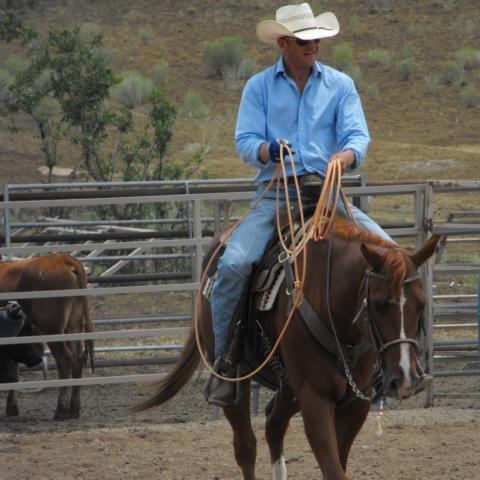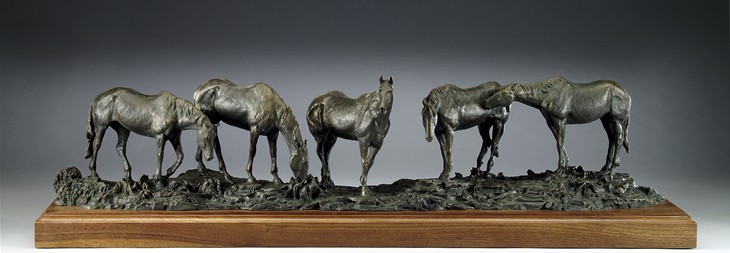|
 ARTIST RESUME ARTIST RESUME
PUBLISHED EDITIORIAL - updating
CURRENT SHOW SCHEDULE
GATHERIN
MATERIAL
Like us on
FACEBOOK

Art of the West . . .March/April
2012
"It's About Showing Power"
Vigor: The word seems slightly old fashioned in this day of
non-stop dependence on technology. Yet Greg
Kelsey relies on it to express his attitude about life - and art.
"I don't know what life would be like without vigor," he says.
For the 40-year-old Colorado sculptor, complacency is
the enemy, whether he's practicing team roping, caring for his horses
and longhorn cattle or working clay."There's nothing more common than a
talented man finding himself unsuccessful in life," Kelsey says.
For him, living is about tackling each day as it comes
and trying to get the most out of it. That intensity shows up in
his Western-themed sculptures, whether he's portraying a bronc twisting
and turning out of the chute, or cowboys wrestling a calf for branding.
Kelsey's mantra is this: "You have to notice what's supposed to be
noticed."
Cowboying and art appear to intertwine completely for
this talented man. He's ridden the broncs, faced the challenge,
and walked away with a hard-won confidence. "I've applied the
bronc rider mentality to the artwork, and it's served me well," Kelsey
says. Back when he first entered art shows and began to make his
living with his art, others were astounded at the way Kelsey risked all
to get into sculpting full time.
"You just have to take the leap and jump," he says.
"I had a wife, a new baby, and a new property, and here i was taking a
chance. But it's like that when you're on the back of a bronc.
You get that self-belief. It's amazing what you can do when you
don't hold yourself back."
Certain building blocks came early for Kelsey, as he
was growing up in Oklahoma. His mother was an art teacher, who
encouraged her son's artistic efforts. "I had art around me my whole
life," Kelsey says. "In a way, you can equate it to a contractor's
kid. What's better than giving a kid a hammer and nails? We didn't
have television or all those kinds of distractions. What was a
better babysitter than art materials? But i never considered
making a career of art when i was a kid."
While attending school in El Paso, Texas, Kelsey
benefitted from another strong presence, that of David Bryson, his
agriculture teacher and Future Farmers of American (FFA) leader.
That organization, Kelsey says, provided leadership skills,
entrepreneurial attitudes, and speaking opportunities and exposed him to
a rural lifestyle. A strong supporter of FFA, he feels the
agriculture program should be available in every city school because of
what it can teach young people about relationships between humans,
animals and the land.
After high school graduation, however, Kelsey opted for
a pre-dental curriculum and enrolled at the University of Texas at El
Paso. While there, he also worked occasionally for orthodontist
Dr. Ed Sullivan, who not only utilized Kelsey's steady hand in the
dental lab, but also introduced him to sculpture. Sullivan's art
collection made a lasting impression. Kelsey also noticed that a
dentist's challenges of working in the tight spaces of a patient's
mouth, the manual dexterity, and the use of precision instruments were
vital skills for sculpting. Yet the time was not right for him to
pursue art as a career; the rodeo life enticed him instead.
While riding horses was nothing new for Kelsey, hanging
onto a bucking bronc was. He admits that his mother would have
never supported his rodeo pursuits when he lived at home but, once he
moved out at 17, he gravitated toward the new adventure and was quickly
hooked. After two years of college, he dropped out and became a
cowboy. Working on various ranches in the Southwest, he mastered
roping and riding, always testing himself and growing in his
understanding of the animals he worked with.
Even while riding broncs, he subconsciously learned
about the anatomy of motion in animals. "It's all about you and
that animal," he says of rodeo work. "It's about conquering
something bigger than yourself."
In today's Western art world, Kelsey says he's met more
than his share of critics, who regard sculpture of bucking horses as
something of a cliche. "There are lots of bucking horse sculptures
out there, but not everyone has been underneath a bucking horse, or
experienced the broken ribs, sore back, or broken nose," he says.
"That's my challenge. The bucking horse is something of an icon,
and I want to show what I've learned from the animal. It's not
just about the bucking horse; it's about showing power."
The melding of rodeo work, cowboying, and art didn't
fully gel until Kelsey's mother talked him into going back to college.
He'd been slogging through four-foot drifts to feed cows, participating
in rodeos, and just getting by. While living in Durango, Colorado,
he signed up for classes at Fort Lewis College, a small school with a
good art department. Once he got into a sculpture class, things
came together. Kelsey also met Terah while still in school and the
two were married in 1997. Soon after, they purchased 35 acres of
land out in the county. Eventually, Kelsey abandoned college,
falling just 13 credits short of graduating with an art education
degree.
In 2000, he accepted an artist in residence gig in
Utah, with a new gallery promoting his work. He moved his family,
which by then included baby daughter, Lauren, (and now includes son
Wilder) to Park City, where he was befriended by noted sculptor Ed
Fraughton, whose work he admired. When Kelsey offered to work for
free in Fraughton's foundry, Fraughton insisted on paying him and set
him to work welding bronze the first day. The foundry work was an
education in itself, but soon the gallery was requesting Kelsey's
full-time attention.
As part of the artist-in-residence assignment, he spent
the summer in Jackson Hole, Wyoming. "I would fly fish in the morning,
sculpt all day, then rodeo in the evenings," Kelsey says with a laugh,
admitting that that was his version of normal at the time. Once
back in Durango, he was feeling somewhat established. Outside his
studio windows, horses and longhorns grazed, and inspiration for his art
was everywhere.
"I've lived my research," Kelsey says of his first hand
experiences with cowboy living. "Others spend money to go places
for the research, but I spend mine right here. The research
expense is right outside my door."
In his sculpting, Kelsey continues to master the
behavior of clay and bronze. "Everything I see is a possible piece
of work," he says of the beginning creative process. "I have to
really think about the piece in 3D, and I work out a lot of the problems
in my head."
A major challenge in bronze, Kelsey adds, is
anticipating the behavior of light. "I have to know what the various
surfaces in metal will do," he says, noting that he prefers the
traditional opaque patina in his finished works. "If it's smooth,
it will reflect light and, if it's textured, it will soak up the light.
I have to really explore the medium, because the properties of metal are
so different from those of clay. There's a lot of trial and error,
and the discovery is still going on for me. I'm always looking at
form, as well. The form has to own its space and compete with its
surroundings."
A quest for light's behavior in the deep recesses of
each sculpture is a constant pursuit for the cowboy artist, because he
often sculpts in extreme detail. "You need that detail to stress
the power and strength of your subject, but you can also sculpt loose on
certain areas, so the eyes flow across them," Kelsey says.
While Kelsey's sculptures enjoy the limelight at
prestigious shows and galleries, and he gathers his share of honors, he
shies away from spending too much time comparing notes with other
artists. Instead, he prefers to focus on his own visions and
expectations. "I want to learn what's in me," Kelsey says.
"I want to master the medium and bring it across to others. It is what
I am meant to do. This is about conquering something bigger than
yourself."
|


